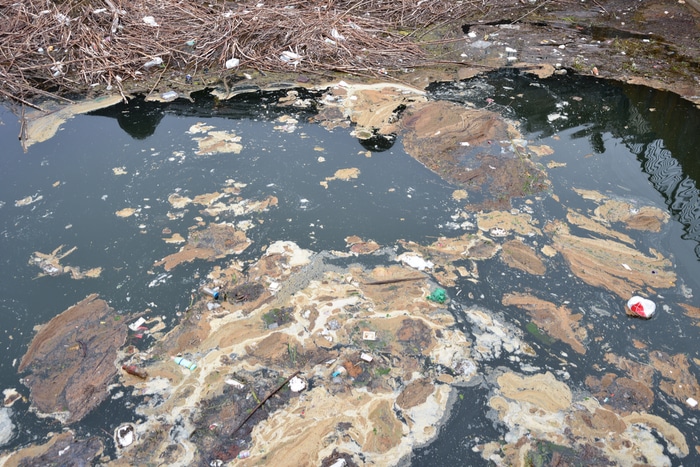Retail giants H&M, Marks & Spencer, Zara and others have been accused of purchasing material from factories in Asia which are turning rivers black with toxic pollution.
According to campaign group Changing Markets Foundation, the retailers are buying material from Chinese and Indian viscose factories. Despite it often being promoted as an ethical fibre as it is plant-based, these factories use a chemical intensive process which produces dangerous pollutants.
The waste from the viscose manufacturing process is reportedly putting locals‘ health at risk, contaminating drinking water and raising the likelihood cancer.
Changing Markets Foundation‘s report stated that in Jiangxi, south-east China, the production of viscose has turned the water of a local lake black, killing wildlife and stunting crop growth.
READ MORE: M&S launches new environmentally sustainable & community-focused plan
Furthermore in Pradesh, India, a spike in birth defects and cancer has been reported after the ground water and soil was contaminated by viscose waste.
“Cheap production, which is driven by the fast fashion industry, combined with lax enforcement of environmental regulations in China, India and Indonesia, is proving to be a toxic mix,” Changing Markets’ report said.
Changing Markets campaign manager Natasha Hurley added: “This report reveals that some of the world‘s biggest brands are turning a blind eye to questionable practices within their supply chains.
“With water pollution increasingly being recognised as a major business risk, shifting to more sustainable production processes should be high on retailers‘ agendas.”
In a statement to the Retail Gazette, Zara’s parent company Inditex said it works with its suppliers to improve conditions and ensure that they adhere to sustainable practices.
“In the case of the viscose supply chain, traceability is Inditex‘s first priority, and in 2014 we became a founding member of the Canopy commitment to engage cellulosic suppliers directly,” a spokesperson said.
“Through this commitment we have mapped our cellulosic fibre suppliers and worked firstly, to guarantee that they source wood pulp from sustainable sources verified through Rain Forest Alliance audits, and secondly, that they use environmentally responsible processes.
“Most suppliers have reached this goal, and with others we continue to work to address their environmental impacts – a requirement to remain as an Inditex supplier. We will publish our preferred viscose supplier list, according to compliance with our standards, at the end of this year.”
READ MORE: Slavery to sales: Why high street retailers still use sweat shops
H&M told the Retail Gazette that they were “deeply concerned” with the findings in the report.
“We will follow up with mentioned viscose producers that we source from,” a spokesperson said.
“We are aware of this being an industry problem – that the viscose process unfortunately is very chemical intense which requires that the producers have well managed systems on the production sites for treating the chemicals and the waste and waste water.
“We are currently working on a revised man-made cellulosic fiber policy that also will include the viscose fiber production process.
“We have therefore together with an external consultant developed a tool to evaluate the different viscose producers fiber production processes in their different production facilities.
“Firstly we want the viscose producers to improve their viscose process to be more sustainable. But if the producer is not willing to meet our expectations on sustainability we will stop sourcing from them.”
Meanwhile, an M&S spokesperson told Retail Gazette: “The issues raised in this report are concerning – which is why the use of chemicals in viscose manufacturing is firmly on our agenda.
“We already encourage suppliers to produce more responsibly or more sustainably by incentivising them with an M&S accreditation if they do so.
“We know that there is much more to do though and we are currently working on an approach for the fibre manufacturers who supply our suppliers that would bring them within scope of our Environmental & Chemical Policy.”
Click here to sign up to Retail Gazette‘s free daily email newsletter


















